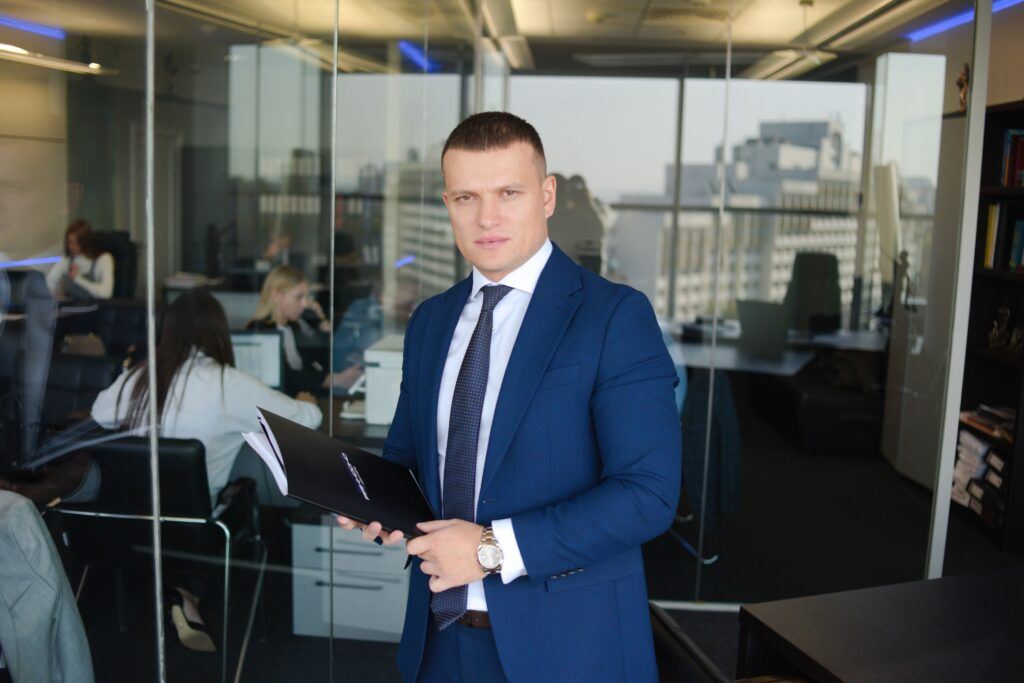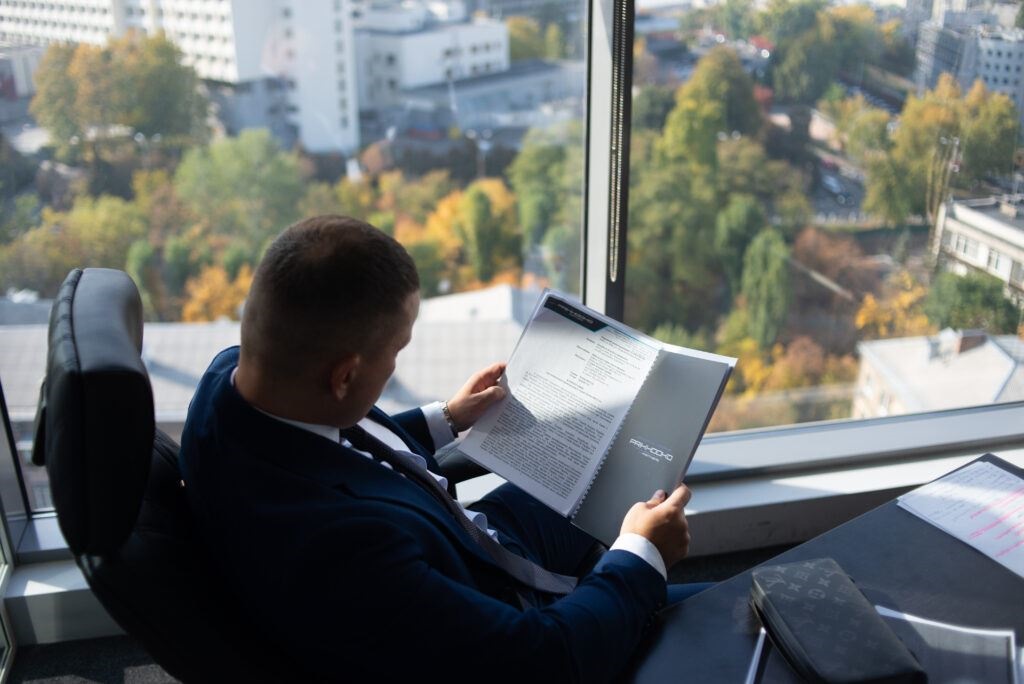
«I personally guarantee that we will honestly and decently do our job!»
Managing partner
Lawyer, Doctor of Laws, recognized media expert on legal issues, legal adviser to famous politicians and businessmen.
A.A. PRIKHODKA INCLUDED IN THE WORKING GROUP FOR THE ASSESSMENT OF CORRUPTION RISKS IN THE ACTIVITIES OF THE DPS OF UKRAINE
The Department for the Prevention and Detection of Corruption of the DPS reports that based on the results of the consideration of the candidacy of Andriy Anatoliyovych Pryhodek, the DPS has made a management decision to include him in the working group for assessing corruption risks in the activities of the State Tax Service of Ukraine.
As of today, the DPS has approved the Regulations on the Working Group for Assessing Corruption Risks in the Activities of the State Tax Service of Ukraine (DSS Order No. 465 dated 22.07.2022), which can be found at the link https://tax.gov.ua/diyalnist-/zakonodavstvo -pro-diyalnis/nakazi-pro-diyalnist/77503.html
This Regulation defines the tasks and powers of the working group on assessing corruption risks in the activities of the State Tax Service of Ukraine (hereinafter - the working group), regulates the organization of its activities.
In this Regulation, the terms are used in the sense given in the Law of Ukraine "On Prevention of Corruption", the Methodology of Corruption Risk Management, approved by the order of the National Agency for the Prevention of Corruption dated 28.12.2021 No. 830/21, registered with the Ministry of Justice of Ukraine on 17.02.2022 under No. 219/37555.
The working group is a permanent advisory body of the DPS.
In its activities, the working group is governed by the Constitution of Ukraine, international treaties approved by the Verkhovna Rada of Ukraine, laws of Ukraine, acts of the President of Ukraine, the Cabinet of Ministers of Ukraine, the National Agency for the Prevention of Corruption, other acts of legislation and these Regulations.

The tasks of the working group are:
- Planning work on assessment of corruption risks;
- Study of the DPS environment and determination of the scope of corruption risk assessment;
- Information exchange and consultations with internal and external interested parties, including through their survey (questionnaire), interviews;
- Identifying, analyzing and determining the levels of corruption risks;
- Development of measures to influence corruption risks.
The working group in accordance with the tasks assigned to it:
- coordinates organizational issues of its activity (means of communication, meeting places, methods of documentation, information accumulation, information exchange, etc.);
- draws up a plan for assessing corruption risks and preparing an anti-corruption program;
- organizes obtaining information for assessing corruption risks by using various sources of information;
- examines the environment of the DPS and determines the scope of the assessment of corruption risks:
- defines the functions and assets of the DPS, which constitute a significant economic value;
- identifies internal and external interested parties of the DPS, analyzes the nature of their interaction with the DPS;
- compiles a list of normative legal acts and administrative documents regulating the activities of the DPS;
- collects and analyzes information about other factors of the DPS environment;
- prepares analytical reports based on the results of collection and analysis of information about the DPS environment;
- approves the list of functions (individual processes) in the activity of the DPS as potentially vulnerable to corruption;
- identifies corruption risks:
- describes potentially corruption-vulnerable functions, processes (sub-processes) in the activity of the DPS;
- analyzes the described potentially corruption-vulnerable functions, processes (sub-processes) in the activity of the DPS;
- identifies and documents in detail individual elements of corruption risks;
- determines the levels of corruption risks;
- develops measures to influence corruption risks;
- considers proposals and comments to the draft anti-corruption program regarding the results of the assessment of corruption risks;
- interacts with the public and other external interested parties on issues within the competence of the working group;
- performs other powers related to the performance of main tasks on the instructions of the Head of the DPS or a person performing his duties.
Робоча група для виконання покладених на неї завдань має право:
- Upon written request, receive information and documents (copies of them) necessary for the performance of the tasks assigned to the working group from the structural subdivisions of the DPS and its territorial bodies, taking into account the provisions of the legislation on information protection;
- Conduct surveys and interviews of DPS employees and external interested parties;
- If necessary, involve other employees of the structural units of the DPS and its territorial bodies in the work group's activities;
- When assessing corruption risks, use different sources of information;
- To attract the necessary material and technical resources to ensure their activities;
- Participate in the public discussion of the draft anti-corruption program;
- To make proposals to the Head of the DPS or the person performing his duties regarding the improvement of the activities of the DPS in the field of preventing and combating corruption.
The personal composition of the working group is approved by the order of the DPS. The chairman of the DPS or the person who performs his duties determines the chairman, deputy chairman and secretary of the working group.
The head of the working group is an employee of the Department for Prevention and Detection of Corruption by position, no lower than the head of the department. The head of the working group has a deputy. In the absence of the chairman of the working group, his duties are performed by the deputy chairman of the working group.
With prior consent, members of the working group include representatives of the public and experts, including international organizations, who have knowledge of the internal and external environment of the DPS and have experience in the field of its activities and/or in the field of preventing and/or combating corruption.
Members of the working group have the right to:
- get acquainted with the materials that belong to the powers of the working group;
- express your position during the meeting of the working group and participate in decision-making by voting;
- initiate, if necessary, the convening of a meeting of the working group, as well as make suggestions regarding consideration of issues not specified in the agenda;
- exercise other powers related to the work group's activities.
Members of the working group are obliged to:
- personally participate in the work and meetings, including voting, of the working group;
- comply with the requirements of this Regulation;
- carry out, within the limits provided by this Regulation, the tasks of the head of the working group and the decisions of the working group;
- be impartial and objective;
- not to allow the disclosure of information (including with limited access), which became known to them in connection with participation in the work of the working group, and not to use it in their own interests or in the interests of third parties;
- in the event of a real or potential conflict of interest, comply with the requirements of anti-corruption legislation.

The main form of activity of the working group is meetings, which are held in accordance with the plan for assessing corruption risks and preparing an anti-corruption program, or in case of need.
A meeting of the working group is valid if at least two-thirds of its members are present.
The decision of the working group is adopted by a simple majority of votes and is formalized in the minutes of the meeting. In the event of an equal distribution of votes, the vote of the chairman of the working group is decisive.
The protocol shall include the list of those present at the meeting of the working group, the issues that were considered, the decisions made as a result of the discussion of the relevant issue, and the voting results.
Each member of the working group has the right to add to the minutes the proposals and comments made during the meeting on the issue raised.
Decisions of the working group, adopted within the limits of its authority, are of a recommendatory nature.
The protocol of the meeting of the working group is drawn up in accordance with the requirements of the Instructions on record keeping in the State Tax Service of Ukraine, approved by the order of the State Tax Service of Ukraine No. 222 dated 12.20.2019 (as amended). Such a protocol is signed by the chairperson of the meeting, brought to the attention of all members of the working group and kept in the division for the prevention and detection of corruption.
Calculate the price of assistance:
1 question
Have other lawyers handled your case?
2 question
Are you in Kyiv or Kyiv region?
3 question
Do you need legal assistance urgently?
Other articles on this topic:
call back
during the day




